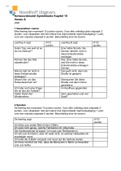Money, banking, and fnanniaa aakets
RADBOUD UNIVERSITEIT NIJMEGEN
Fanuaty of Manage ent
, Table of contents
Lentuae 1: Chaptea 1 & 2.........................................................................................................................2
Lentuae 2: Chaptea 3&4..........................................................................................................................4
Lentuae 3: Chaptea 5&6..........................................................................................................................8
Lentuae 4: Chaptea 7.............................................................................................................................13
Lentuae 5: Chaptea 8 & 10.....................................................................................................................17
Lentuae 6 – Chaptea 13 & 14.................................................................................................................21
Lentuae 7 – Chaptea 15 & 16.................................................................................................................24
Lentuae 8 – Chaptea 17 & 18.................................................................................................................29
Lentuae 9 – Chaptea 19 & 24.................................................................................................................32
Su aay aentuae..................................................................................................................................35
1
, Lecture 1: Chapter 1 & 2
Financial markets serve to allocate capital as efcient as possible.
Bonds (obligaties):
The basic bonds are discount bonds.
2
, When the government has a debt, they sell bonds in order to get money to
cover the debt. They sell the bond and assure the buyer he/ she will get a
certain amount of money back within a period of time (maturity).
If the bond is worth €1000, you’d pay less than that amount for the bond
itself.
Once there is a decrease in trust in bonds, the demand will decrease and
therefore the price of bonds will decrease as well.
Stock (aandelen):
Stockholders get dividends → right to a certain % of the future profts of a
company.
If new information comes available about the interests, that could make
our expectations change, which will lead to a change in the stock prices.
Rumors of a change in interest often lead to a change in the stock prices:
interest increase → saving money increases → stock price decreases (saving
money delivers you a higher interest rate and is more secure than stocks).
There is a negative relationship between stocks and bonds:
increase interest rate → decrease stock → increase bonds
decrease interest rate → increase stock → decrease bonds
What determines the interest rate? What determines the value of fnancial
assets?
Keywords are: confdence and trust.
Asset: anything with value.
Financial asset: pieces of paper which gets their value from something else.
Security: claim issuers’ future income/ assets bond.
Bond: a debt security that promises to make payments periodically for a specifed
period of time.
Interest rate: the nominal cost of borrowing.
Common stock (equity security): represents a share of ownership in a
corporation.
A share of stock: a claim on the earnings and assets of the corporation
(Dividends).
An explanation for negative interest rates: you are willing to take a loss to keep
your money safe.
Financial crises are major disruptions in fnancial markets that are characterized
by sharp declines in asset prices and the failures of many fnancial and
nonfnancial frms.
Lack of (trust in) information
Often preceded by sharp increases in prices (bubbles).
Bubbles: Sharp increases in prices, above “fundamental value”
Bubbles:
3




